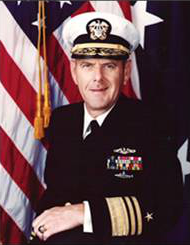
Adm. Michael C. Colley
Described by a close friend as a “voice of reason” within the Libertarian Party, and another as an “all-around libertarian,” retired U.S. Navy Vice Admiral Michael C. Colley passed away on Jan. 19, 2013, at his home in Gulf Shores, Ala. — a month before his 75th birthday.
Colley became involved in the Libertarian Party after more than 30 years of service in the U.S. Navy. A year after he joined the Alabama Libertarian Party in 2003, he started serving the first of his three terms as at-large representative on the Libertarian National Committee.
Friends and family described him as having an excellent work ethic and noted him for his generosity, thoughtfulness, intelligence, loyalty, and insight. He also had a “deep appreciation” for the U.S. Constitution and loved U.S. history.
“He always talked about our founding fathers and what that meant for his country,” said Kendall Colley, his youngest of two daughters, adding that he impressed those values on his children from a very young age.
She said that the night before he died he entertained guests in an “animated” fashion about the Declaration of Independence, and even gave them pocket-sized copies out of his stockpile.
“I got my first one in my stocking many, many years ago,” Kendall said.
“He was the greatest Libertarian I’ve personally known,” said retired U.S. Navy Petty Officer 1st Class Steve Stone, who will dedicate an upcoming book — the working title, “A Libertarian’s Manifesto” — to Colley.
Colley began serving as Commanding Officer (C.O.) on the U.S.S. Narwhal in 1975. Stone recalled that he was “very demanding” in that position, but mainly on his fellow officers — and that to the enlisted men he was unfailingly friendly.
“He was never not working,” Stone said. “If he was taking leisure time, he was thinking about problems that needed to be solved when he returned to task.”
Despite kidney trouble in his late age, Colley still liked to take his motor home for camping trips. He also managed to give friends phone calls just to touch base. He was a family man who was committed to his marriage right until the passing of his wife, Arlen, in 2001.
Libertarian activism and philosophy
In her earliest memories, Kendall recalls her father as being a Republican. She can’t remember when he switched to Libertarian.
He was largely responsible for the planning and execution of the 2010 LNC Convention in St. Louis, but was also interested in outreach to college students.
He lent his national security expertise to the Bill Redpath for U.S. Senate 2008 campaign and the Redpath for U.S. House of Representatives 2010 campaign.
Kendall said his Libertarian Party activism was like a “second career” for him.
“Typically, we don’t get a lot of high-ranking military officers to come and be involved in the Libertarian Party,” said James Lark, whom Adm. Colley would routinely ask for advice during Lark’s term as LP national chair from 2000 to 2002. “So I thought it was very, very nice that we evidently attracted one who was interested in the party.” Lark served on the LNC with Adm. Colley for each of his three terms.
After a decorated career and retirement from the Navy in March 1994, Colley worked for a top-secret think tank on national security issues. His military experience brought him “a comparative advantage vis-a-vis most of the other people” on the LNC, Lark recalled.
The admiral always advocated that the purpose of the United States military was defense and “not to serve as the world policeman,” or “build democracy or engage in nation-building,” Lark said.
“He also didn’t have any illusions about the nature of bad people in positions of authority in other parts of the world,” Lark said. “He was not someone who felt we can all just get along.”
Colley was interested in civil liberties issues and opposed government regulation “of all facets of our lives.” On immigration, he welcomed people coming to the United States to “enjoy the freedoms we have,” Kendall recalled, and opposed building a fence on the U.S.-Mexico border.
While Colley was a leader and libertarians looked to him for advice, he wasn’t afraid to seek advice himself.
“I think he would be the first one to say that when he accomplished something it was usually because he was part of a good team,” Lark said.

